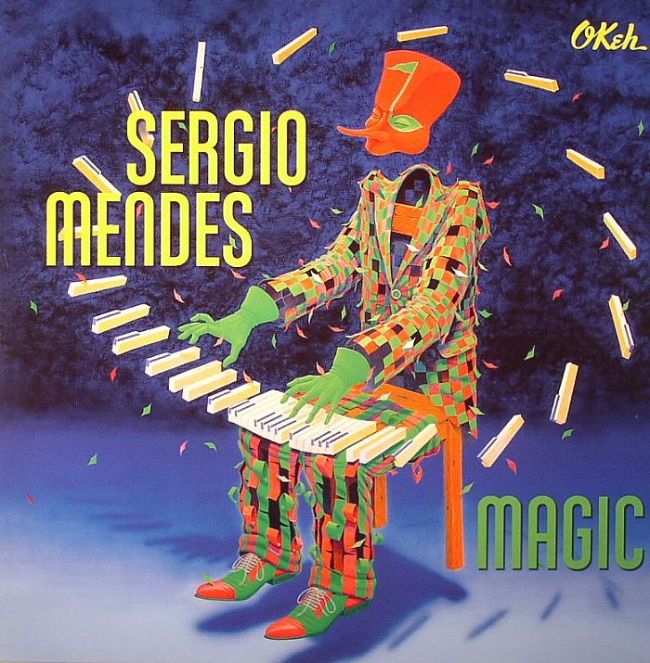Eyelike: alt-J returns with beautiful, baffling LP
By Korea HeraldPublished : Sept. 26, 2014 - 22:21

alt-J
“This Is All Yours”
(Atlantic)
The new album from alt-J isn’t supposed to exist. Nobody, we’re told, wants to hear this kind of stuff anymore. The album ― and especially this artsy kind of album ― is dead.
Yet here is “This Is All Yours”: weird, complex, goofy, sublime, baffling and completely unlike anything else out so far this year. You might say the album has arrived just in time, spicing up a bland year with something of a puzzle for listeners who prefer their music complex (or fairly inscrutable, in this case).
“This Is All Yours” is probably a concept album. Maybe about traveling the world and opening your eyes to new experiences. Or about hooking up. Who knows? There’s not enough time in the day to sort it out, and a lot of the references are delightfully nonsensical. Singer-guitarist Joe Newman sings about the cool side of the pillow, licking the inside of a snack bag of cookies and Tetris. The band even employs an incongruous ― but somehow note perfect ― Miley Cyrus sample.
There are some lush, beautiful orchestrations here ― most notably the sublime “Warm Foothills” and lilting “Choice Kingdom” ― interspersed with the kind of oddball pop that first drew our attention on Mercury Prize-winning debut “An Awesome Wave.” Alt-J is at its best when it indulges its weirdest impulses, crafting angular music that bumps along elegantly like a bicycle with triangle wheels.
“Left Hand Free” pleasantly evokes Blitzen Trapper’s “Wild Mountain Nation” phase, a ramshackle party with exotic delights (maybe).
And then there’s “Hunger of the Pine,” a slow-building song that opens with the electronic beating of a heart, builds with the help of Miley singing “I’m a female rebel” from her song “4x4” on an irresistible loop and finishes in a collage of sound that’s dazzling.
What does it mean? No idea. Go listen and figure it out for yourself. If you have the time. (AP)

Callaway pays tribute to Sarah Vaughan
Ann Hampton Callaway
“From Sassy to Divine: The Sarah Vaughan Project”
(Shanachie)
Ann Hampton Callaway has undeservedly flown under the radar as a jazz singer. Perhaps that’s because of her successful career as a cabaret chanteuse and songwriter whose more than 250 songs include the theme for the TV sitcom “The Nanny” and tunes for Barbra Streisand’s recent albums.
But her jazz artistry shines forth on “From Sassy to Divine: The Sarah Vaughan Project,” a tribute to Vaughan with more than an hour of music recorded live at Dizzy’s Club Coca-Cola with a top-flight jazz quintet. The album offers a fresh take on songs closely associated with the legendary jazz vocalist such as Stephen Sondheim’s “Send in the Clowns” and the Gershwins’ “Someone to Watch Over Me.”
Callaway captures the playful side of the singer known as “Sassy” on such tunes as Duke Ellington’s uptempo “In a Mellow Tone,” on which she hits the high notes in some swinging scat singing. On “Mean to Me,” Callaway gets bluesy and even imitates Randy Sandke’s muted trumpet in one scat interlude, with Ted Rosenthal playing some old-style stride piano.
Vaughan was also known as “The Divine One” for her operatic voice, perfect sense of pitch and voluptuous tone. Callaway reflects this as she caressingly bends and stretches the notes on a dreamy rendition of Erroll Garner’s ballad “Misty.” And like Vaughan, she hauntingly sings Billy Strayhorn’s “Chelsea Bridge” without words, displaying her full vocal range from the lower registers to the heights.
The closing track is a highlight as Callaway imagines a duet by Vaughan and her close friend, opera singer Leontyne Price, pairing the aria “Un Bel Di” from Puccini’s “Madame Butterfly” with “Poor Butterfly,” a song inspired by that opera, which gives Callaway a chance to display her vocal virtuosity.
Callaway manages to avoid the pitfalls of many tribute albums, which either offer a pale imitation or stray too far from the original material. She has the vocal range, improvisatory flair and passion to channel Vaughan’s spirit without imitating her. (AP)

Mendes spreads joy of Brazil’s music
Sergio Mendes
“Magic”
(Okeh)
Sergio Mendes continues his mission of spreading the joy of Brazilian music to a global audience on his new album “Magic.”
That mission began nearly 50 years ago when he helped merge bossa nova with jazz and enjoyed commercial success with Brasil ‘66’s bossa nova-flavored arrangements of pop tunes. Now, at 73, Mendes doesn’t indulge in nostalgia, instead offering mostly new songs that he wrote or cowrote, blending contemporary styles with Brazilian rhythms in sometimes unexpected collaborations with musicians from different genres.
The album opens and closes with two exuberant sambas that reunite Mendes, John Powell and Carlinhos Brown, who collaborated on the music for the animated “Rio” films. “Simbora (Let’s Go)” and “One Nation,” also on the official FIFA World Cup album, are both guaranteed to get the body moving.
The Black Eyed Peas’ will.i.am, who recorded a hip-hop version of Brasil ’66’s breakthrough hit “Mas Que Nada” with Mendes in 2006, produced the funky “My, My, My, My Love,” mixing electronic percussion with Mendes’ hard-driving acoustic piano.
John Legend contributes his own sensuous lyrics and smooth R&B vocals on “Don’t Say Goodbye” over Mendes’ bossa arrangement, while Janelle Monae easily adapts to bossa with some airy vocals on “Visions of You.”
But “Magic” above all spotlights emerging and established Brazilian artists, including Mendes’ wife, singer Gracinha Leporace, featured on Toninho Horta’s “When I Fell in Love,” a percussive tribute to Brazil’s African-influenced Bahia state.
Milton Nascimento’s trademark falsetto can be heard on his playful tune, “Olha a Rua,” while gravel-voiced Seu Jorge sings and speaks his way through the samba “Sou Eu” composed by Mendes’ mentor Moacir Santos. Ana Carolina sings the ethereal ballad “Atlantica,” engaging in a tender vocal duet with Mendes, sensitively accompanied by the song’s composer, the master guitarist Guinga. The younger generation is represented by Maria Gadu, who cowrote “Meu Rio” with Mendes, on which her powerful dusky vocals build to a rollicking climax. (AP)
-
Articles by Korea Herald



![[Herald Interview] 'Amid aging population, Korea to invite more young professionals from overseas'](http://res.heraldm.com/phpwas/restmb_idxmake.php?idx=644&simg=/content/image/2024/04/24/20240424050844_0.jpg&u=20240424200058)













![[KH Explains] Korean shipbuilding stocks rally: Real growth or bubble?](http://res.heraldm.com/phpwas/restmb_idxmake.php?idx=652&simg=/content/image/2024/04/25/20240425050656_0.jpg&u=)

